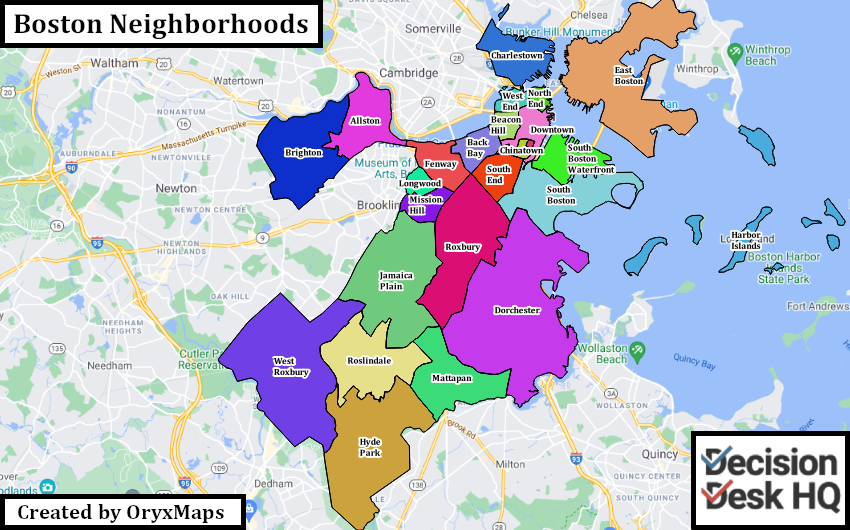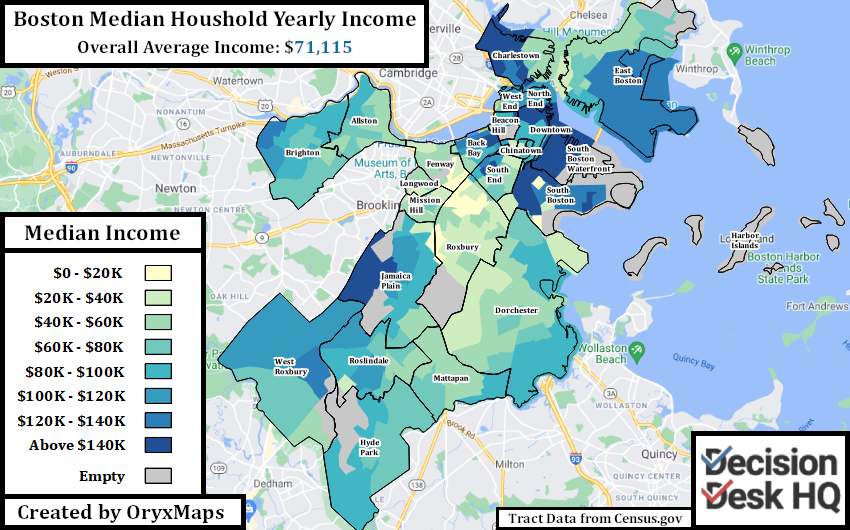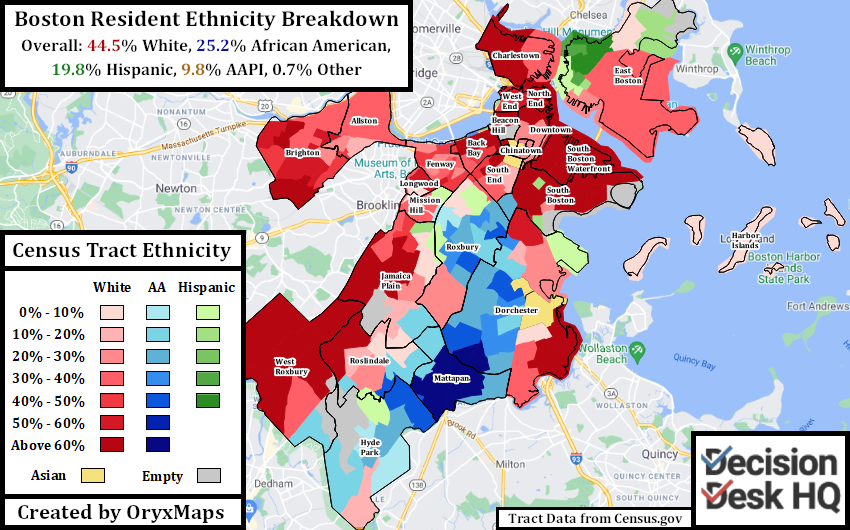Boston Mayor Marty Walsh became President Joe Biden’s Secretary of Labor on March 22nd. His confirmation leaves the 2021 Boston mayoral race wide open and without a clear frontrunner. Boston uses a nonpartisan “blanket primary” system. The top two candidates will advance from the September 14th preliminary election (official term, henceforth referred to as a primary) to the general election runoff in November. Walsh’s temporary acting successor, Kim Janey, is running for a full term, but she faces six other candidates in her bid for election. No candidate has an obvious advantage and there are enough undecided voters to upend the present trajectory of the race.

Appointed Incumbency
The Boston City Council elected District Councilor Kim Janey as the Council’s president in 2020, which made her the acting Mayor after Mayor Marty Walsh resigned. Janey is the first woman and the first person of color – she is African American and a resident of the diverse Roxbury neighborhood – to serve as Boston’s mayor, but she is technically only a transitional, acting mayor. She must win in November to replace the transitional title with an official one. Boston’s mayoral race is officially nonpartisan; her Democratic identity – and every other candidate’s partisan label – will not appear on the ballot.
While Janey, is not the elected mayor, her transitional incumbency offers unique advantages. Janey’s prominent position means that her actions appear in local media, building name recognition and a public image. These actions include coordinating Boston’s Coronavirus recovery, overseeing public schools reopening, firing Boston’s Police Commissioner Dennis White over long-term domestic abuse allegations, and passing her own yearly budget for the city. Her success attracts followers, such as City Councilor Ricardo Arroyo and his supporters among the Hispanic community. Janey receives just above 20% of the vote in the most recent polls of the race, yet more than 25% of voters in these polls are undecided.
Janey’s position resembles that of San Francisco’s Mayor London Breed. Breed became Acting Mayor in December 2017 upon the death of Mayor Ed Lee. Even though she lost her transitory position in late January 2018, Breed’s brief tenure in office cloaked her candidacy in an aura of competence and authority. Breed won the eight-candidate ranked-choice election and became the first African American woman to serve as elected mayor of San Francisco.
The Competition and their Campaigns
Kim Janey’s top rivals for the mayor’s office are fellow female City Councilors, two of whom have also served as the Council’s president. They are Michelle Wu, Annissa Essaibi George, and Andrea Campbell. All are Democrats.
Michelle Wu is the progressive option for the race, but this label does not accurately capture her candidacy. Wu supports implementing a city-specific version of the “Green New Deal,” supports rent control, and touts endorsements from progressive organizations and Elizabeth Warren. She however prefers to focus on Boston-specific problems and ignores most prominent issues championed by national progressives. Wu’s campaign pairs these policies to her Taiwanese ancestry and the immigrant experience. She polls near or above 20%, essentially equal to Kim Janey – even in her own internal polls.

Annissa Essaibi George is campaigning as a technocratic former teacher. She seeks and bases proposals on community assistance and suggestions. This strategy would ideally benefit all parties through mutual cooperation. Citywide education reform, from preschool to university, is critical to Essaibi George’s campaign and stems from her experience as a teacher. Her history of listening to communities means that Essaibi George believes she can reform police and essential services with input from both sides, something that has led to endorsements from these groups and their unions. Essaibi George uniquely voted for Acting mayor Kim Janey’s city budget, whereas Michelle Wu and Andrea Campbell contrasted themselves with Janey’s campaign and voted against it. Polls find that Essaibi George has about 15% of the vote, with the exception of an outlier with Essaibi George receiving 22% of the vote.

Andrea Campbell is running as a representative for the diverse and historically disadvantaged communities across central Boston. All candidates have plans to address and reduce the poverty in central Boston, but Campbell frames all her proposals as plans to first correct for inequality and benefit the greater city second. Among her campaign’s proposals are: more green space in those areas lacking parks; a task force to address concentrated homelessness and improve mental health; bring struggling public schools up to par with successful ones; and, reform the City’s planning (zoning and construction) department to make it accountable to all citizens. At forums Campbell noted how recent urban development focused on gentrification and construction in predominantly White neighborhoods, bypassing vacant land in poorer sections of the City. Campbell is a strong fundraiser, and has endorsements from African American community leaders, but she trails the other three candidates by about five to ten percent in recent polls.
Three other candidates are in the race but trail the four top tier by a wide margin. These are: Democrat John Barros who served as Chief of Economic Development for Mayor Walsh, retired police officer and perennial candidate Robert Capucci, and political gadfly Richard Spagnuolo.
An Open Race
The top two candidates presently hold tenuous leads. Polls for the mayoral race find between 20% and 30% of voters lack a preferred candidate. These voters might not vote given the off-cycle nature of the primary, they may be uninformed about the race and the candidates, or they may be deciding between several candidates. A large pool of undecided voters means potential fluidity. Michelle Wu and Kim Janey presently lead, but both could potentially lose their position to one of the other candidates. Voters generally pay more attention to upcoming elections rather than those more distant. The New York City Mayoral race showed that political prospects can change dramatically in under a few weeks, and Boston voters have over a month to decide who will appear on the November ballot.
Ben Lefkowitz (@OryxMaps) is a Contributor to Decision Desk HQ.